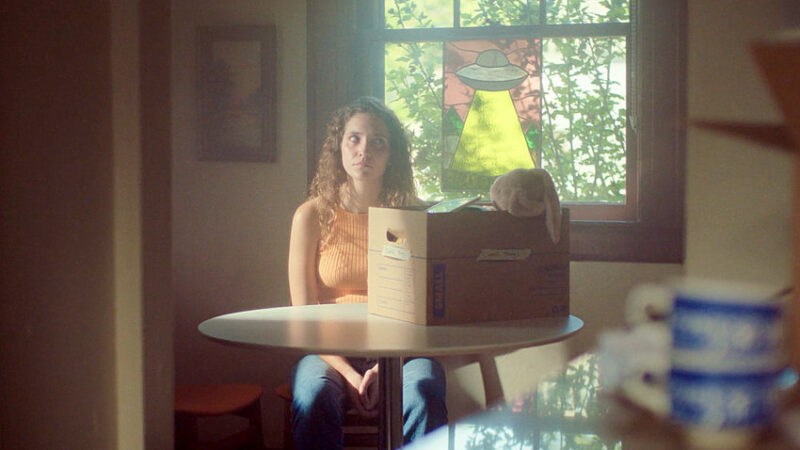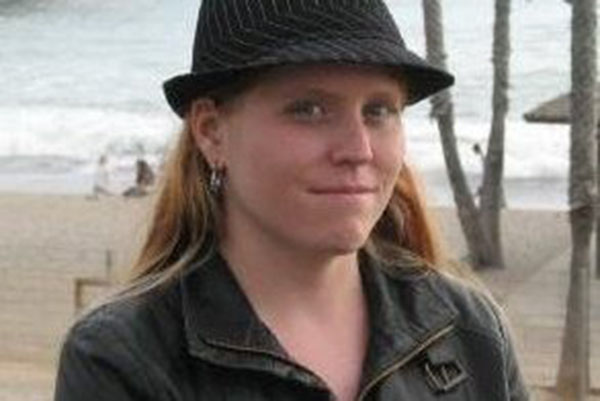
Tricia Minty is a music composer for media. She has written music for a variety of formats including feature-length films, short-films, web-series, video games, trailers, and commercials. From a very young age, she always had a very strong passion for music. One of the earliest memories of Tricia with music is with portable tape cassette player trying to figure out how to play the melodies and harmonies of the Beatles and Beethoven on her old Square Grand piano.
As a young child, Tricia Minty had a moderate-severe expressive language disorder and didn’t begin talking till she was about four years old. Despite this though, her parents saw that she had a strength and talent with music and Tricia began formally taking piano lessons at the age of six. Her interest in music composition and theory really didn’t begin to grow till she began studying with her piano teacher and mentor, Rhonda Bradley. As an assignment, she handed Tricia Minty a few of her own original piano pieces that she had composed and instructed Tricia to write a few different arrangements of her pieces.
With this assignment, Tricia Minty fell in love with music theory and the art and science of composition. From that point on, everything she listened to and was able to get a score of Tricia analyzed. She loves the process of figuring out and breaking down the harmonies and melodies in a piece of music. Analyzing how the instruments in the orchestration complement or support each other and figuring out why it sounds amazing? It’s a big brain teaser or puzzle to Tricia that is fun to deconstruct.
indieactivity: Write about your career briefly?
Tricia: Initially, I started out writing music strictly for the concert setting and was writing music for string quartets and small chamber ensembles. In 2010, my chamber ensemble piece “Wicked Dreams” won the Thanatopolis Music Prize Award and was premiered at the Thanatoplis Exhibition at I-Park in East Haddam, Connecticut. Also that year my electronic piece, “The Closing Corridor” was selected to be part of the 2010 ICMC Mix of 360 degrees of 60×60, and premiered in the 2010 Dance Parade on Broadway in New York City.
I started scoring music for short films and feature-length films produced by amateur and student filmmakers in 2009 and 2010. In 2013, I started scoring music for an ongoing web-series called “The Galactic Adventures of John Neptune” produced by Neptune Cinema. The first season of the web-series was selected and featured at several film-festivals. It has won numerous awards including “Best Web-Series” at the 2014 “Galactic Film Festival” and the 2015 Idyllwild International Festival of Cinema.
My score for the web-series also won the “Daisy Rock Guitar Award for Excellence in Scoring by a Woman” at the 2015 Idyllwild International Festival of Cinema.
indieactivity: Did you study music or film scoring?
Tricia: Went to California State University, Fresno and earned my Bachelor’s degree in Music Composition under the study of Dr. Kenneth Froelich in addition to a second major in Communicative Disorders and Deaf Studies. My Music Composition studies at CSU Fresno were primarily focused on writing music for the concert setting.
However, I was fortunate to have the opportunity to take summer workshops and classes on writing music for the media through a program that was being offered at the time at CSU Fresno called CSU Summer Arts. Through this program, I had the opportunity to study under various other composers for film and games including Ed Kalnins, Elizabeth Sellers, Garry Schyman, Jim Dooley, Jeff Atmajian, and others.
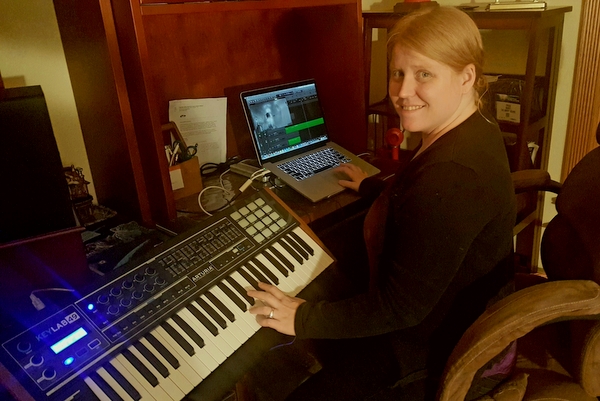
Tricia Minty working in her studio
After graduating with my Bachelor’s degree in 2011, I continued on with my Master’s Degree in Communicative Disorders-Speech Language Pathology and did my Master’s thesis on a music therapy treatment method for childhood language disorders.
indieactivity: Describe your process as a film composer?
Tricia: The composition and collaboration process partially depends on the project itself which can include many factors. One factor is the format of the project itself (i.e., video game, feature-length film, short film, or commercial). Projects for films can take anywhere from one to six months where as a project for a video game can span anywhere between two to three years. However, I’m also currently involved in projects including the web-series, “The Galactic Adventures of John Neptune” which have span over four years. The process can also be influenced by the requests made by the producers.
A few producers have requested for me to start writing music as the projects is being filmed or edited. In these instances, I typically will have very little or no visual material to write to or get inspiration from. I’ll have a short description of the character or the scene and maybe the script if I’m lucky. This is often the case for “John Neptune” if I am working on a new theme for a character or if the music plays an integral part in the scene and needs to be written ahead of time to be edited or filmed to. Video game developers also typically hire the composer early on in the project and the composer will start writing music as the game is being developed.
In most cases for film projects, I’m often hired on to score the music towards the end of the filmmaking process. Having a composer write original music score for a film is often considered to be the “last step” before the film is premiered. I’ve been hired on to write a score three to four weeks out before the scheduled premier of the film. There are pros and cons to both of course.
In most instances for film projects though, the producer will contact me and give me a concise description of the project and then will send me a screen locked edit of the film. Depending on the producer and the editor, some projects may have a “temp music score” already edited to the film and the producer may either love the “temp music” or hate it.
Once I’ve received the screened locked edit of the film, I then will watch the film at least three to four times or more till I am able to replay the whole movie in my head. I then create a “cue sheet” which includes a description and framework of all of the music cues to be written for each scene in the film. I then use the “cue sheet” as a collaborative starting point with the producer to discuss what kind of music he or she is looking for in each scene.
The key to a positive and successful scoring process with a project is the collaborative relationship between the producer and the composer. There has to be both trust and clear communication. When these things happen, it makes the entire process incredibly rewarding. Collaborating with producers, developers, and other creative individuals is one of my favorite aspects of writing music for games and film.
They’re asking you to score music to essentially their “babies” and if the project is good, there’s a lot of passion and time that’s been put into it. My job is to bring the framework of their ideas to life and give meaning to it.
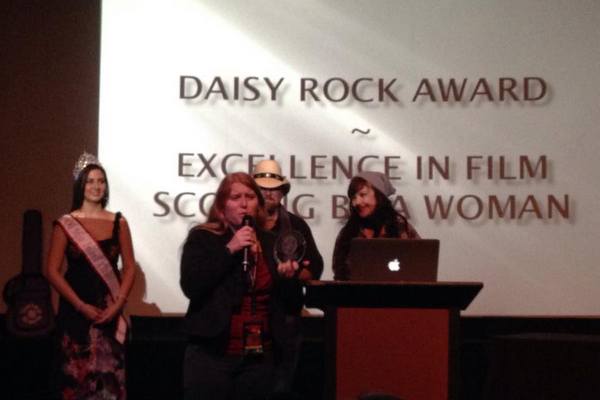
Tricia Minty at Idyllwild accepting award
indieactivity: Who is your greatest inspiration?
Tricia: It’s difficult for me to select and discuss just a few. I’ve been blessed with some great teachers and mentors that have helped me along the way. There are also a lot of composers and musicians that I admire and get inspiration from. I’m a very passionate person though and can get inspiration from almost anything if I relate to it or if it strikes me the right way. I’m also fortunate to have very strong and stubborn internal drive and determination.
This partially comes from my father who has worked almost his entire life. In a lot of aspects, I inherited his personality and work ethic to always lean forward and keep on progressing up the ladder. I’ve always felt this duty or purpose to serve, help, and inspire others. When scoring music, I get inspiration from the people that I am collaborating with as well as the project itself. It’s a privilege to be in this profession and have the opportunity to collaborate and score music with fellow creative individuals.
My hope is that by creating and scoring music, I am spreading creativity and am influencing and inspiring others to do the same.
indieactivity: How would you describe the influence of your work?
Tricia: It ranges and depends on the project. I listen to a very wide range of genres from rock, jazz, electronic, classical, film scores, and a lot in between. Believe this is important to do as a film composer because we are often asked to score music from a wide range of styles and genres. A lot of my music for “retro” style projects like “The Galactic Adventures of John Neptune” is influenced by 1950’s sci-fi music scores like “The Day the Earth Stood Still” by Bernard Hermann mixed with some John William’s style of orchestration and thematic development.
For horror music scores, I take a lot of inspiration from early twentieth century composers like Igor Stravinsky as well as film composers such as Jerry Goldsmith and Bernard Hermann. Goldsmith’s score for the original “Omen” is one of my favorite horror film scores. The main title theme for the opening sequence sends me chills every time. Also love the scores that Hermann did for Alfred Hitchcock films including “Vertigo” and “Psycho.”
indieactivity: What books do you read? Do you talk at a seminars?
Tricia: No I don’t talk at seminars, but I do read when I have time. Currently reading a book called “The Score” by Michael Schaelle which consists of interviews that Schaelle conducted with film composers such as John Barry, John Corigliano, James Newton Howard, Shirley Walker, and Thomas Newman. It’s a fun read which I highly recommend. The last book I finished reading was “Musicophilia” by Oliver Sacks. Highly recommend it especially if you are interested in music therapy or how music is cognitively processed in our brain. It’s a fascinating field of research that is quickly growing.
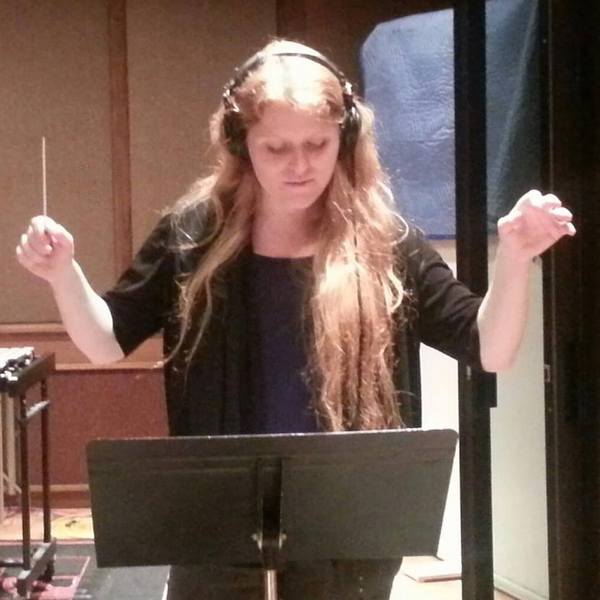
Tricia Minty conducting an art song for a short film, Barriers
indieactivity: When you get a project, what procedures do you implement?
Tricia: When I receive a “screen-locked” edit of a film, the first thing I do is watch the film at least three or more times. Once I feel like I have a grasp of the pacing of the film and understanding of the themes and characters, I create a cue sheet. After I have created and discussed the cue sheet with the producer and we have decided on the music themes and framework of the score, I then start writing. If the score calls for very memorable and melodic themes, I write those themes first on the piano with pencil and paper. If I have time available, I always prefer to write at the piano first to flesh out all of my melodic ideas before going to the computer.
Most of the time though, I’m on a short time frame with an immediate deadline so I have to start writing and figuring my ideas in my DAW (Digital Audio Workstation) on my laptop as soon as possible. Once I’m ready to start writing and orchestrating my ideas on my laptop, I import the movie into my sequencer. I use both Logic and Pro Tools as my music and audio workstations. For most films, I write music linearly from beginning to end. This is not always the case though. Sometimes, I’ll write music to a very important moment or montage in the middle or at the end of a film first, especially if the music is very essential and integral to the characters or overall story line.
I also sometimes go out of order and prioritize scenes with lots of action like gun fights or space battles. These types of scenes require high energy and fast paced music which are usually the most time consuming to write.
indieactivity: Tell us about near misses, your failures and successes?
Tricia: All composers have stories about “failed” collaborations which usually stem from a lack of communication or understanding of what the producer is looking for. This has happened to me before with amateur and young filmmakers. I’ve had collaborations where the filmmaker wanted to have constructive criticism, but didn’t know how and didn’t truly know what he wanted for the music score. Or maybe they thought they did, but now they’ve changed their mind or are just not sure and are too embarrassed to admit that they don’t know. The challenge is, most filmmakers are not musically educated or even well read on music scores. As a result, it is often our job to figure out what the filmmaker is meaning or intending to say.
Fortunately, most of my collaborations have been positive (including my collaborations with young filmmakers). I enjoy teaching young filmmakers the collaboration process for scoring their film and showing them how original music can elevate their project. Working with younger filmmakers can also be an opportunity for starting a long-term collaborative relationship. Not every filmmaker or project “makes it” though. Projects can face delays or fall apart due to a variety of reasons (including personal and budget reasons) that are often out the composer’s control.
The key is to always lean forward no matter the circumstances and always keep your eye out and be open to new projects and opportunities.
IMDB | Facebook | Soundcloud | Vimeo | Twitter



